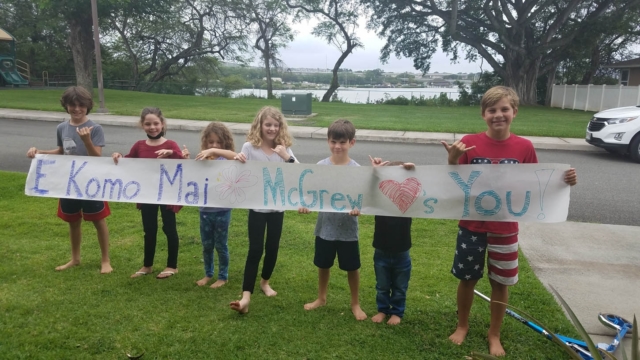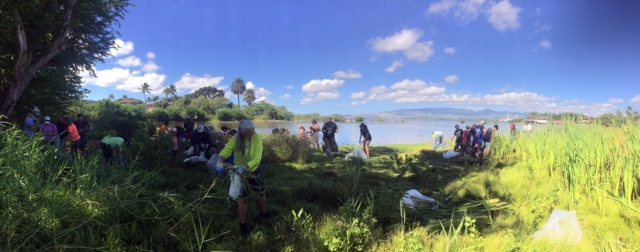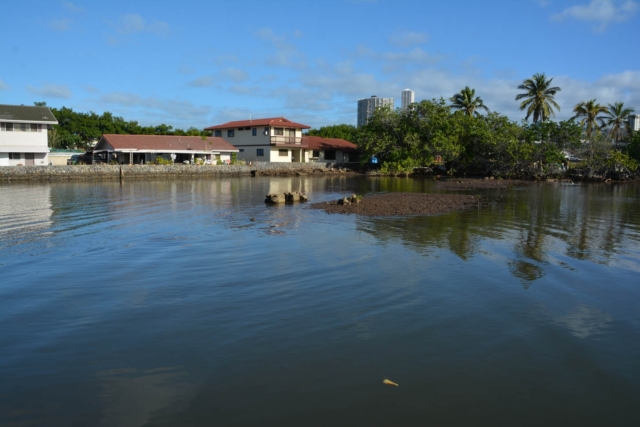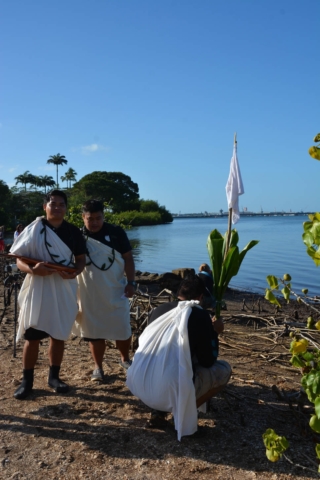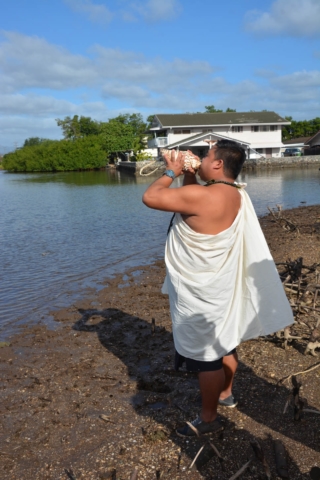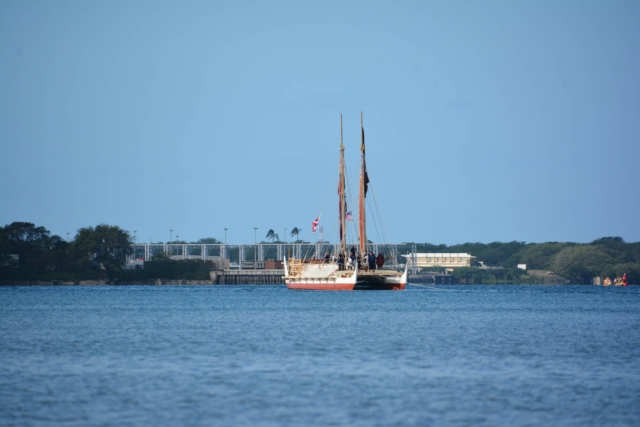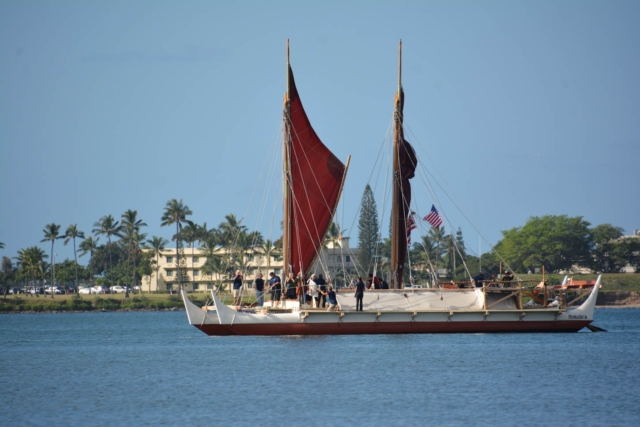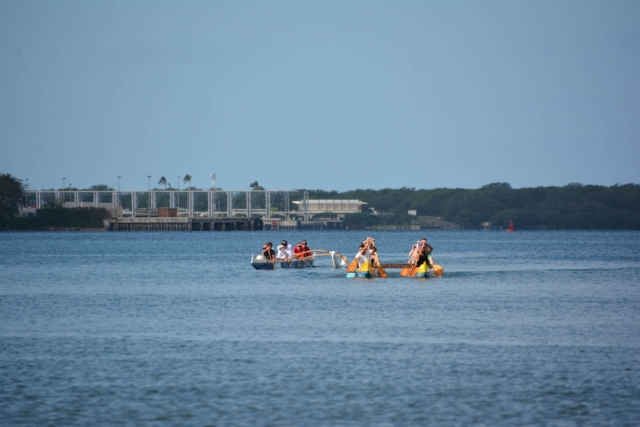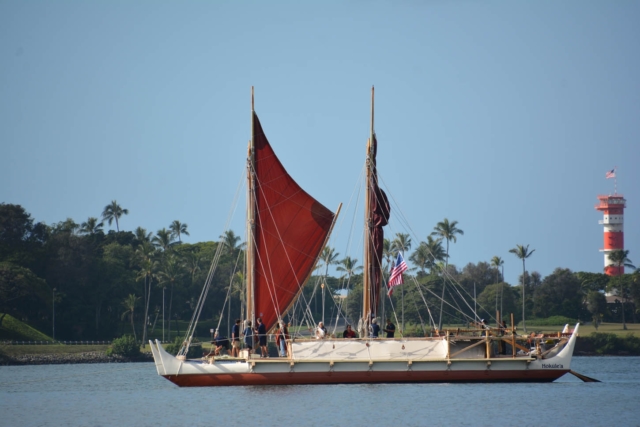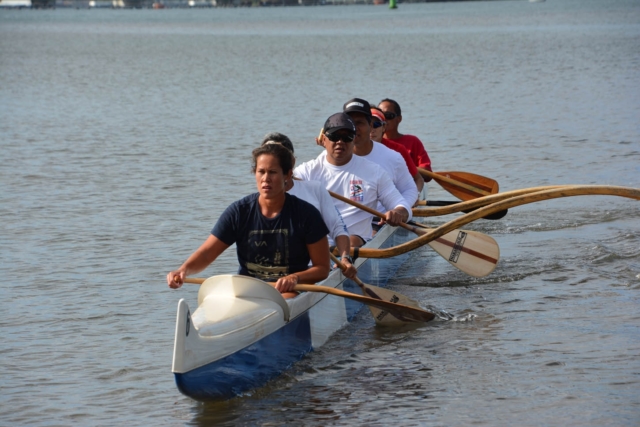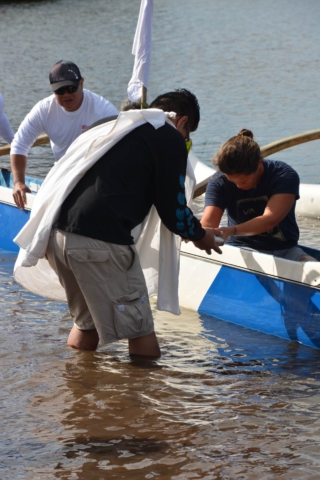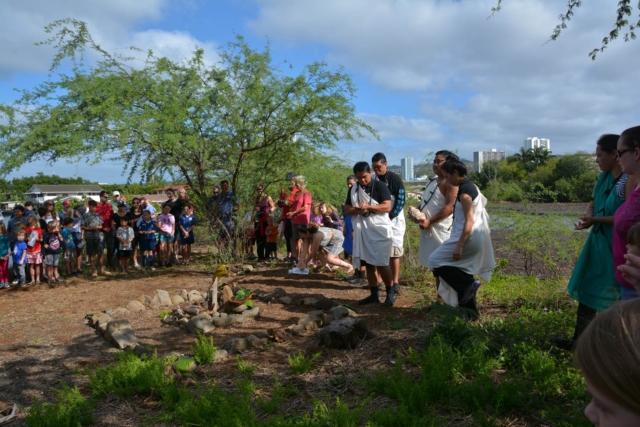
Hōkūleʻa Moʻolelo: The First Visit to Pearl Harbor
- Posted on 23 Feb 2018
- In Featured, Hōkūleʻa History & Moʻolelo, Newsletter, Photo Galleries, Stories of Place, Teachers
On February 12, 2018, the legendary canoe Hōkūleʻa sailed into the waters of Pearl Harbor, also known as Ke Awa Lau o Puʻuloa. Prior to mooring, crewmembers offered a hoʻokupu (customary gift) of fresh fish for one of the few remaining ancient Hawaiian fishponds in the area. Although it was Hōkūleʻa’s first trip to the area in her 42-year history, the visit carries far deeper significance: it marks the first time in hundreds of years that a deep sea voyaging canoe has paid homage to the Hawaiian community of Puʻuloa

By Kehaulani Lum
We are truly honored to have Kehaulani Lum share her reflection of the event as well as some history of Puʻuloa – Kehaulani is President of Aliʻi Pauahi Hawaiian Civic Club, which was founded in 1973 to promote Hawaiian culture and values, in honor of Princess Bernice Pauahi Bishop. The all-volunteer club is based inʻAiea and has a MOU with the Navy to restore the 400 year old Loko Iʻa Paʻaiau (Paʻaiau Fishpond), one of only three fishponds remaining in Ke Awa Lau o Puʻuloa. Kehaulani’s ancestor was the last guardian of the fishing altar and protector of the manō, at the mouth of the harbor.
The True Meaning of Mahalo
In modern day Hawaiʻi, “Mahalo” can sometimes be the hardest word to say.
Mahalo to the rain, even though, it cancelled my hike.
Mahalo to the sun, even though it burned my back.
Mahalo to the speeding freeway driver, even though he cut me off.
Mahalo for teaching me gratitude, patience and love.
Our kupuna understood intimately that the essence of the word is far more profound than a simple, “Thanks.” As Andrews defines it: “Ma and halo, to look out; to turn the eyes upon. To admire; to wonder at; to magnify the goodness or virtues of a person or thing.”
To see the Divinity in each and every being.

When Navigator Nainoa Thompson and PVS humbly asked our community for permission to bring Hōkūleʻa into Ke Awa Lau o Puʻuloa, for the first time in its history, they reached back hundreds of years, to magnify the goodness of our ancestors and harness their healing power for a planet in need of love.
Our response was unanimous: “Our children sit taller, because of Hōkūleʻa. You must come!” “We built an ahu at Loko Iʻa Pāʻaiau, to cause something to happen! And, here you are! Please come!”

Volunteers and practitioners built an ahu (cultural altar) at Loko Iʻa Pāʻaiau.
A week later, carrying esteemed leaders and practitioners, sacred oli, offerings of flowers and fish and centuries of voyaging genealogy on its deck, Hōkūleʻa entered Pearl Harbor with such grace, humility, skillful practice and Aloha that the hundreds who lined her path bowed, blew their horns, saluted, waved, flashed the shaka and smiled.
 One woman, a guide on the “Mighty Mo,” upon whose deck Japan’s surrender brought World War II to an end, simply couldn’t contain herself. “This is AWESOME!” she yelled down the side of the towering ship! “Mahalo,” responded the navigator.
One woman, a guide on the “Mighty Mo,” upon whose deck Japan’s surrender brought World War II to an end, simply couldn’t contain herself. “This is AWESOME!” she yelled down the side of the towering ship! “Mahalo,” responded the navigator.
For our ʻOhana, descendants of the last steward of the ancientʻahu at the mouth of Puʻuloa, Hōkūleʻa’s great act brings the powerful medicine that is needed to deliver us from the generational pain of Kaopulupulu’s prophecy.
“This is a pivotal event in our history,” said cousin Mahealani Lum, a native Hawaiian physician. Hōkūleʻa embodies the resilience and solidarity of the Hawaiian people, and all people, and its return to Puʻuloa signifies a forward movement to learn from our past, enrich the youth, and promote growth and sustainability of the Hawaiian culture.”

Local Hawaiian youth practice the protocol of receiving hoʻokupu on the shoreline of Loko Iʻa Pāʻaiau.
Her brother, Kaleo, an undergraduate student in Information Computer Systems at UH Manoa, echoed: “Hōkūleʻa’s visit to Loko Iʻa Pāʻaiau was an affirmation of all of the hard work and time spent restoring and preserving the ʻāina in a seemingly endless struggle. She brought the mana from around the world to this sacred place, making us all proud to know that our ancestors are pleased.”

The hoʻokupu of fresh offshore fish provided by visitors and returning fisherman is believed to improve fishing and abundance at fishponds.
And, from my father, the patriarch of our ʻOhana, Winston Kalina Lum, Sr. whose grandfather and uncle, a century earlier, together protected the fisheries from Keʻehi to Maunalua, “Hōkūleʻa has raised our cultural pride and brought us closer to our seafaring ancestors and their humbling accomplishments.”
400 years ago, Kalanimanuia, Moʻi Wahine of Oʻahu and the beloved daughter of Kakuhihewa, governed in peace and abundance from her home just a stone’s throw away from the dock where Hōkūleʻa landed. In the same way, today, the canoe is helping our entire community see what we can, and must, do to live her values in contemporary times, in order to save our planet.
Our hearts are filled with gratitude and deep love for our magnificent Hōkūleʻa and all who made this journey possible.
Mahalo Hōkūleʻa! Your presence is the most treasured pearl of all.
Ke Aloha O Paʻaiau: A chant in honor of the arrival of Hōkūleʻa to Loko Iʻa Paʻaiau, Ke Awa Lau o Puʻuloa, February 10, 2018. Composed by Mahealani Lum and offered to the ahu by her brother, Kaleo, and cousins Pakilika Lum and Nuʻoli Dowson, with hoʻokupu from Hōkūleʻa. Kim Moa, Erika Vargas, Kawehi Lum, Keoki Freitas, the Pollard ʻOhana, and residents of Paʻaiau assisted with the ceremony. Mahalo nui loa to Nainoa, Noelani, Keala and the entire Hōkūleʻa crew for their gifts.
ʻO Ka Wahine, Kalanimanuia – Gratitude to our aliʻi Kalanimanuia
Maluhia Puʻuloa, wai hū i Kalauao – Tranquil are the waters of Puʻuloa, fed by Kalauao
ʻO ke awa o Kaʻahupahau – Guarded by Kaʻahupahau
A Kanekuaʻana, e piha Paʻaiau – Nourished by Kanekuaʻana, who fills Paʻaiau with abundance
Kala i ka ʻeha, ola hou ke aloha – Let us be free of the pain here, a revival of peace and love
Uhau ka ʻupena, e Kahiʻuka – With your protective net, Kahiʻuka
Kahu i ka loko, mālama i ka ʻāina – We are keepers of the loko iʻa, all must care for this land
E ola ka lahui, e ola pua iʻa – To sustain our people, the young fish must be nurtured
He iʻa nui e hōʻea mai – A great fish of wisdom has arrived at our shores
He ʻimi ʻike e aʻo mai – A seeker of knowledge, here to enlighten and inspire
E komo mai i ke aloha e – Welcome, enter with peace and love
E komo mai i ka mahalo e – Welcome, enter with gratitude

